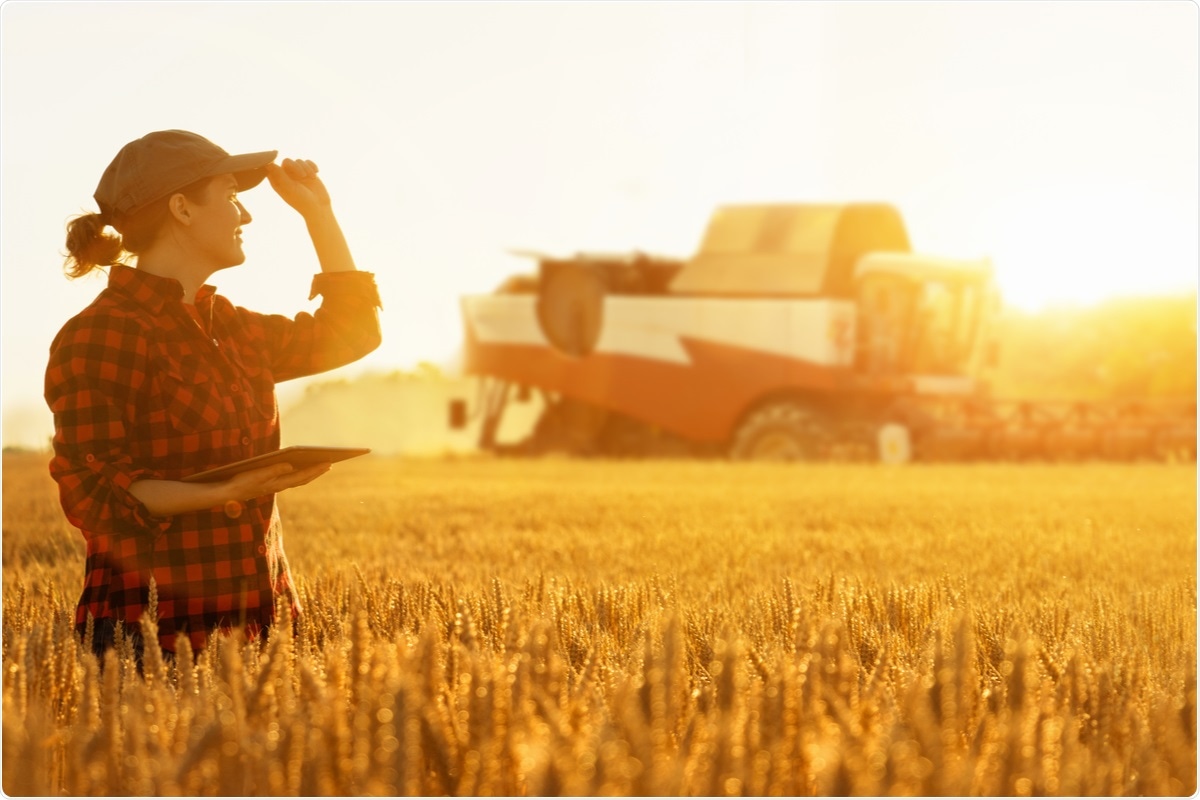Practical technological solutions may be key to ensuring food security in the future. Under growing pressures to increase food production, agricultural practices may need to transition towards ‘precision agriculture’ where automated technology responds in real-time to crop dynamics.

Image Credit: Scharfsinn / Shutterstock
Modern agriculture is facing a range of emerging challenges, including global climate change, rapidly growing populations, more competition for space and energy, as well as declining soil quality. By 2030, the United Nations (UN) estimates that 840 million people will be affected by hunger, and many more by poor diet quality.
In response, research efforts have focused on integrating technological advances to address such emerging issues and mitigate their impacts. For instance, a roadmap has been developed to combine smart and nano-enabled agricultural practices combining AI and machine learning to combat food insecurity.
The objectives of technologically-driven agriculture aim for farmers to respond in real-time to rapid changes in crop growth, pest and pathogen outbreaks, and other crop-related changes using nanotechnology and artificial intelligence (AI).
An international team of researchers led by scientists at the University of Birmingham, UK, developed a series of steps to follow that could harness AI and integrate the power of nanomaterials safely, sustainably and responsibly, into agricultural practices. The team was also composed of agricultural and technological experts from the Hellenic Military Academy, in Vari, Greece and Novamechanics Ltd, in Nicosia, Cyprus.
Current estimates show nearly 690 million people are hungry - almost nine percent of the planet’s population. Finding sustainable agricultural solutions to this problem requires us to take bold new approaches and integrate knowledge from diverse fields, such as materials science and informatics.”
“Precision agriculture, using nanotechnology and artificial intelligence, offers exciting opportunities for sustainable food production. We can link existing models for nutrient cycling and crop productivity with nano informatics approaches to help both crops and soil perform better - safely, sustainably and responsibly.”
Study co-author Iseult Lynch, Professor of Environmental Nanosciences at the University of Birmingham.
The findings published by the researchers in the journal Nature plants elaborated on the following four developmental steps:
- Understand the long-term fate of nanomaterials in agricultural environments and how nanomaterials can interact with roots, leaves and soil;
- Assess the long-term life cycle impact of nanomaterials in the agricultural ecosystem, such as how repeated application of nanomaterials will affect soils;
- Take a systems-level approach to nano-enabled agriculture - use existing data on soil quality, crop yield and nutrient-use efficiency (NUE) to predict how nanomaterials will behave in the environment;
- Use AI and machine learning to identify key properties that will control the behavior of nanomaterials in agricultural settings.
Overcoming shortages of space, abuse of pesticides, and declining environmental health
With the growing demand for more food, the intensification of agriculture has led to extremely poor nutrient usage, posing a series of threats to environmental quality, contributing to greenhouse gas emissions. An estimated 11% of global greenhouse gas emissions originate from agriculture, a proportion estimated to continue rising due to the intensification of agricultural efforts.
Nitrogen fertilization is of particular concern as it is 300 times more potent than CO2 in inducing global warming effects and is a product often used to fertilize large areas of agricultural land. However, technological advances, as discussed in this study, could directly contribute to limiting such effects.
For instance, nano fertilizers offer the potential to target crop fertility, enhance nutrient enrichment and reduce nitrous oxide emissions, thus contributing to the net-zero greenhouse gas emission by 2050 targets under the UK Climate Change Act.
Further benefits of transitioning towards nanomaterials include the improvement of crop yield and production rates, boosting soil health and plant resilience, improving resource efficiency, and developing smart sensor plants that can monitor and alert farmers to environmental or biotic stress.
Such features are particularly advantageous due to the increased appearance and resilience of pests and pathogens, necessitating new mitigation strategies.
Integrating further technological developments may also boost other aspects of agricultural practices, but combining them and integrating such combinations could prove particularly fruitful.
Computational approaches including AI and machine learning will have a critical role in driving the progress of nano-enabled agriculture. Such approaches are already starting to gain regulatory acceptance for safety assessment of nanomaterials, allowing the development of safe-by-design nanomaterials for consumer products and medicine.”
Co-author Dr Peng Zhang, Research Fellow at the University of Birmingham.
Approaches must, therefore, also consider the perspective of the stakeholder who will be responsible for the successful end-product and maintenance of technologies. However, if successful, using technology such as AI and nanotechnological materials may help address various issues currently facing agriculture.
Integrating AI and nanotechnology into precision agriculture will play a vital role in probing the design parameters of nanomaterials for use in fertilizer and pesticide delivery to ensure minimal impacts on soil health coupled with minimal nanomaterial residues remaining in the edible tissue portions - helping to ensure safe and sustainable agriculture.”
Journal reference:
- 'Nanotechnology and artificial intelligence to enable sustainable and precision agriculture' - Peng Zhang, Zhiling Guo, Sami Ullah, Georgia Melagraki, Antreas Afantitis and Iseult Lynch is published by Nature Plants.